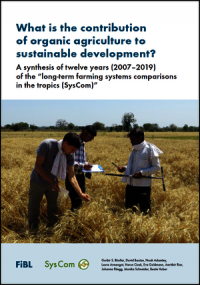
The report “What is the contribution of organic agriculture to sustainable development? A synthesis of twelve years (2007-2019) of the long-term farming systems comparisons in the tropics (SysCom)” has been launched a the External Cooperation InfoPoint conference of the European Commission on International Partnerships. The results of 12 years of comparative farming systems research in Kenya, Bolivia, and India provide scientific evidence on economic and ecological sustainability of organic and conventional systems. They illustrate how organic systems and other agroecological approaches can contribute to the SDGs by 2030.
The 2030 Agenda for Sustainable Development and the 17 Sustainable Development Goals (SDGs) aim to end poverty and other deprivations. There is substantial evidence illustrating that the dominant agricultural management practices are not sustainable for the future. Organic agriculture is proposed as an alternative, but its performance under tropical conditions is questioned as long-term studies are scarce.
The conference has addressed whether organic agriculture is a realistic pathway for smallholders in the Global South and if it can support the transformation of food systems. Furthermore, it has addressed some key issues of the SDG's such as responsible consumption and production as well as eliminating poverty and hunger. The results will be reflected in the view of the Committee on World Food Security (CFS) with regards to its work on agroecology.
In his presentation, Dr. Gurbir Bhullar, country coordinator of SysCom India, explained: "We learned from the research in Kenya, India and Bolivia that organic yields can match those of conventional systems yet varies depending on the crop and management practices. Thus, organic systems could be managed successfully and profitably."
Dr. Noah Adamtey, country coordinator SysCom Kenya added: “We also found that organic systems can build up soil fertility over the long-term if managed well – that is especially for Africa key to increase productivity and enable food security.” Monika Schneider, coordinator of the project in Bolivia further elaborates: "It was fascinating to see that the biodiversity in the organic agroforstery system was enhanced because the system offers suitable habitats and food sources for different bird species."
Beate Huber, program leader of SysCom and President of FiBL Europe, concluded: "Organic farming has proven to have the potential to contribute to the transformation of the food system also in low-income economies. Yet, to exploit this huge opportunity, we have to invest in research and capacity building to close knowledge gaps as well as acknowledge with fair remuneration and a supportive policy and business environment the vital contribution of farmers to sustain public goods."
The report can be downloaded HERE. Other information at this LINK
Source: European Commission/FIBL



